What Caused Increasing Us Crude Oil
What a daunting question! With oil prices increasing apace in the recent past, information technology is hard not to wonder what has caused it and just what effect it might have on the rest of the economy. Let me begin by discussing the evolution of oil prices over time.
How have oil prices behaved in contempo decades?
Effigy 1 shows the history of the price of oil since the early 1950s. The price shown is the monthly average spot price of a butt of Westward Texas intermediate rough oil, measured in U.Due south. dollars. The gray bars in this and all the post-obit figures represent recessions, as divers by the National Agency of Economic Enquiry.
Effigy one. Spot Oil Toll ($ Barrel)
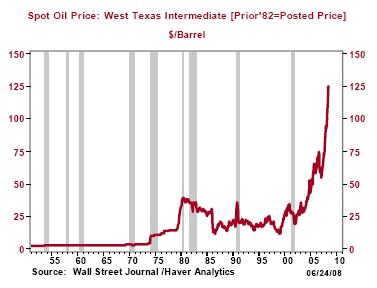
As y'all can meet from Figure 1, a long period of oil price stability was interrupted in 1973. In fact, the 1970s show two distinct jumps in oil prices: i was triggered by the Yom Kippur War in 1973, and ane was prompted by the Iranian Revolution of 1979. Since and so, oil prices have regularly displayed volatility relative to the '50s and '60s.
Effigy 2 shows the "real" oil price, calculated by dividing the cost of oil past the Gross domestic product deflator. 1 This removes the effect of inflation and thus gives a more accurate sense of what is happening to the price of the commodity itself. In essence, the "real" measure out allows you to compare oil prices over time in a way that you lot can't when inflation is also part of the change in price. You tin run across that real oil prices have varied a lot over time, and large fluctuations tend to be concentrated over somewhat short periods. You can also run across that past the bound of 2008, every bit this posting was prepared, the real price of oil has easily exceeded that of the late 1970s.
Effigy 2. Real Oil Price
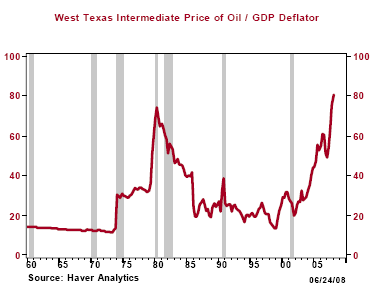
Why are oil prices rising?
It is likely that both increases in need and fears of supply disruptions have exerted up force per unit area on oil prices.2 Global demand for oil has been increasing, outpacing any gains in oil production and excess capacity. A large reason is that developing nations, especially Mainland china and India, have been growing rapidly. These economies have become increasingly industrialized and urbanized, which has contributed to an increment in the globe demand for oil. In addition, in recent years fears of supply disruptions take been spurred by turmoil in oil-producing countries such every bit Nigeria, Venezuela, Iraq, and Iran (Chocolate-brown 2006).
The breathtakingly precipitous increase in the price of oil in the final half of 2007 and beginning one-half of 2008 has led many to argue that increased speculation in commodity markets has played a role, and indeed there is prove of increased action in these markets. All the same, whether speculation is playing a role in high oil prices is open to fence (Krugman 2008). It is also useful to remember that both the need for and the supply of oil react sluggishly to changes in prices in the short run, then very big changes in prices tin exist required to restore equilibrium if demand should move even modestly out of line with supply.
As far as the implications of college oil prices, there are both microeconomic and macroeconomic answers to that question. I will accost both of these aspects in plough.
How practise loftier oil prices affect the economy on a "micro" level?
As a consumer, you may already understand the microeconomic implications of higher oil prices. When observing higher oil prices, most of us are likely to recall about the cost of gasoline as well, since gasoline purchases are necessary for most households. When gasoline prices increase, a larger share of households' budgets is probable to be spent on it, which leaves less to spend on other goods and services. The same goes for businesses whose appurtenances must exist shipped from place to identify or that utilise fuel as a major input (such as the airline industry). Higher oil prices tend to make product more expensive for businesses, only equally they get in more expensive for households to do the things they unremarkably do.
It turns out that oil and gasoline prices are indeed very closely related. Figure three plots average monthly oil prices from 1990 through early 2008, using the spot oil price for West Texas intermediate (right scale, thin blue line, measured in dollars per butt) and the U.Southward. retail gasoline cost (left scale, thick cerise line, measured in cents per gallon). The two series rails each other very closely over fourth dimension: increases in oil prices are accompanied by increases in gasoline prices. As shown in the graph, the correlation coefficient (denoted "r") for the two series is 0.98. Moreover, the monthly changes in oil prices and gasoline prices (non shown) also are very highly and positively correlated.
Figure 3. U.S. Gasoline and Oil Prices
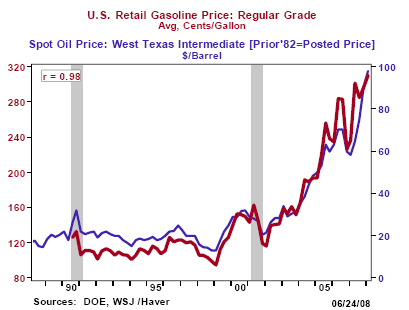
So, when oil prices spike, you tin expect gasoline prices to spike every bit well, and that affects the costs faced by the vast majority of households and businesses.
What effects do oil prices have on the "macro" economic system?
I've only explained how oil prices touch on households and businesses; it is not a far bound to empathize how oil prices affect the macroeconomy. Oil price increases are by and large idea to increase aggrandizement and reduce economical growth. In terms of inflation, oil prices direct affect the prices of goods made with petroleum products. As mentioned above, oil prices indirectly affect costs such as transportation, manufacturing, and heating. The increase in these costs can in turn touch the prices of a diverseness of goods and services, equally producers may pass production costs on to consumers. The extent to which oil price increases lead to consumption price increases depends on how of import oil is for the production of a given type of good or service.
Oil price increases can also stifle the growth of the economic system through their effect on the supply and demand for appurtenances other than oil. Increases in oil prices can depress the supply of other appurtenances because they increase the costs of producing them. In economics terminology, high oil prices can shift upwards the supply bend for the goods and services for which oil is an input.
High oil prices also can reduce demand for other goods considering they reduce wealth, as well as induce doubt nigh the futurity (Sill 2007). Ane manner to clarify the effects of higher oil prices is to recall about the higher prices every bit a tax on consumers (Fernald and Trehan 2005). The simplest example occurs in the case of imported oil. The extra payment that U.S. consumers make to foreign oil producers can now no longer be spent on other kinds of consumption goods.3
Despite these effects on supply and demand, the correlation between oil price increases and economic downturns in the U.S. is non perfect. Not every sizeable oil toll increase has been followed by a recession. However, v of the last vii U.S. recessions were preceded by considerable increases in oil prices (Sill 2007).4
Is the relationship betwixt oil prices and the economy always the same?
The two same large oil shocks of the 1970s were characterized past low growth, loftier unemployment, and high inflation (also ofttimes referred to as periods of stagflation). It is no wonder that changes in oil prices accept been viewed equally an of import source of economical fluctuations.
However, in the by decade inquiry has challenged this conventional wisdom nearly the relationship between oil prices and the economy. As Blanchard and Gali (2007) note, the late 1990s and early on 2000s were periods of large oil price fluctuations, which were comparable in magnitude to the oil shocks of the 1970s. However, these later oil shocks did non cause considerable fluctuations in inflation (Effigy 4), real GDP growth (Figure v), or the unemployment rate.
Figure 4. Oil Prices and CPI Inflation
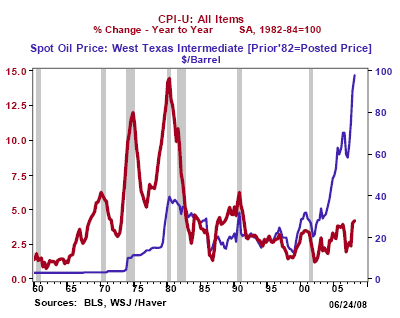
Effigy 5. Oil Prices and Real GDP Growth
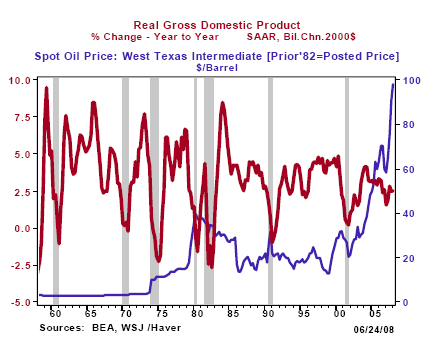
A caveat is in order, notwithstanding, considering simply observing the movements of inflation and growth around oil shocks may be misleading. Keep in listen that oil shocks have often coincided with other economic shocks. In the 1970s, there were large increases in commodity prices, which intensified the furnishings on inflation and growth. On the other mitt, the early on 2000s were a period of high productivity growth, which offset the event of oil prices on aggrandizement and growth. Therefore, to determine whether the relationship betwixt oil prices and other variables has truly changed over fourth dimension, one must get beyond casual observations and appeal to econometric analysis (which allows researchers to control for other developments in the economy when studying the link between oil prices and key macroeconomic variables).
Formal studies detect show that the link betwixt oil prices and the macroeconomy has indeed deteriorated over time. For instance, Hooker (2002) suggests that the structural pause in the human relationship between inflation and oil prices occurred at the end of 1980s. Blanchard and Gali (2007) look at the responses of prices, wage aggrandizement, output, and employment to oil shocks. They too observe that the responses of all these variables to oil shocks have get muted since the mid-1980s.
Why might the relationship between oil prices and key macroeconomic variables have weakened?
Economists have offered some potential explanations behind the weakening link between oil prices and aggrandizement. Gregory Mankiw (2007) suggests increases in free energy efficiency as one explanation. Indeed, equally shown in Figure 6, energy consumption per dollar of GDP has gone down steadily over time. This means that free energy prices matter less today than they did in the past. Blanchard and Gali (2007) suggest boosted explanations. They find that increased flexibility in labor markets, budgetary policy improvements, and a chip of good luck (pregnant the lack of concurrent adverse shocks) have as well contributed to the decline of the touch on of oil shocks on the economy.
Finally, how monetary policymakers treated the economic shocks caused past rise oil prices also may have played a part in the touch of the shocks on economical growth and the inflation rate. Specifically, some have argued policymakers tended to worry more about output than aggrandizement during the oil shocks of 1970s and did non adequately take into account the inflationary aspect of the oil shocks when fashioning a policy response to them (run into, for example, Clarida, Gali, and Gertler 2000). In the case of the U.S., since households and firms sensed that the Fed was not going to pay a lot of attention to aggrandizement, they probably realized that the oil shocks would pb to substantially college futurity inflation and adapted their expectations appropriately. By contrast, the Fed in the 2000s is more than committed to fighting inflation, the public knows information technology, and the issue has been that, even though headline inflation has risen noticeably considering of the direct effects of oil and article shocks, core inflation and inflation expectations remain contained.
The lack of major output effects of oil cost shocks since the 1970s calls into question what role they played during the two recessions of that period. In other words, one possible reason why oil shocks seem to have noticeably smaller effects on output now than they did in the 1970s is that the earth has changed. Another is that the effects of oil shocks were never as large as conventional wisdom concord, and that the ho-hum growth of that decade had to practise with other factors.
Effigy half-dozen. U.S. Energy Consumption
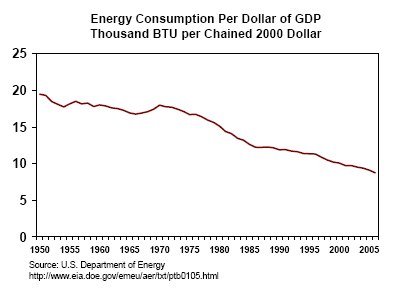
Endnotes
1. Annotation that in that location are many possible ways to measure existent oil prices, depending on which measure of inflation you employ.
2. To read more than near supply and demand pressures on the earth market for oil, consult the Short-Term Energy Outlook provided by the U.Due south. Energy Data Assistants.
iii. Trade does complicate matters here, because some of the U.S. consumption expenditures would accept been fabricated on imports, and so that doesn't bear upon the domestic economy. Second, oil producers will apply some of their income to buy appurtenances from the U.Due south., so that income is not lost to the U.South. Nevertheless, there is a loss hither, considering they tin buy more U.S. exports for each barrel of oil.
iv. At the time this response was written, the NBER had non made an official pronouncement on whether the economy had entered a recession in early 2008.
References
Blanchard, Olivier, and Jordi Gali. 2007. "The Macroeconomic Effects of Oil Shocks: Why Are the 2000s Then Different from 1970s." NBER Working Paper No. 13368.
Fernald, John, and Bharat Trehan. 2005. "Why Hasn't the Jump in Oil Prices Led to a Recession?" FRBSF Economic Alphabetic character 2005-31.
Hooker, Mark. 2002. "Are Oil Shocks Inflationary? Asymmetric and Nonlinear Specifications versus Changes in Authorities." Periodical of Money Credit and Banking, Vol. 34, Outcome two, pp. 540-561.
Krugman, Paul. 2008. "Fuels on the Hill." New York Times, June 27, 2008.
Mankiw, Gregory. 2007. "Where Have All the Oil Shocks Gone?"
Sill, Keith. 2007. "The Macroeconomics of Oil Shocks."
FRB Philadelphia Business concern Review, 2007:Q1.
What Caused Increasing Us Crude Oil,
Source: https://www.frbsf.org/education/publications/doctor-econ/2007/november/oil-prices-impact-economy/
Posted by: hanlonaccurione.blogspot.com


0 Response to "What Caused Increasing Us Crude Oil"
Post a Comment